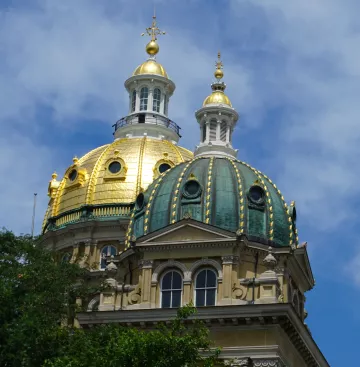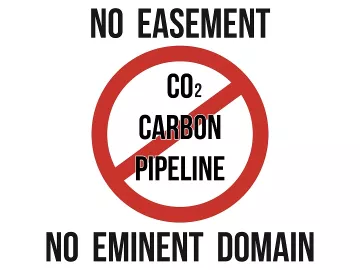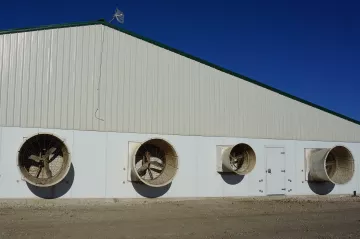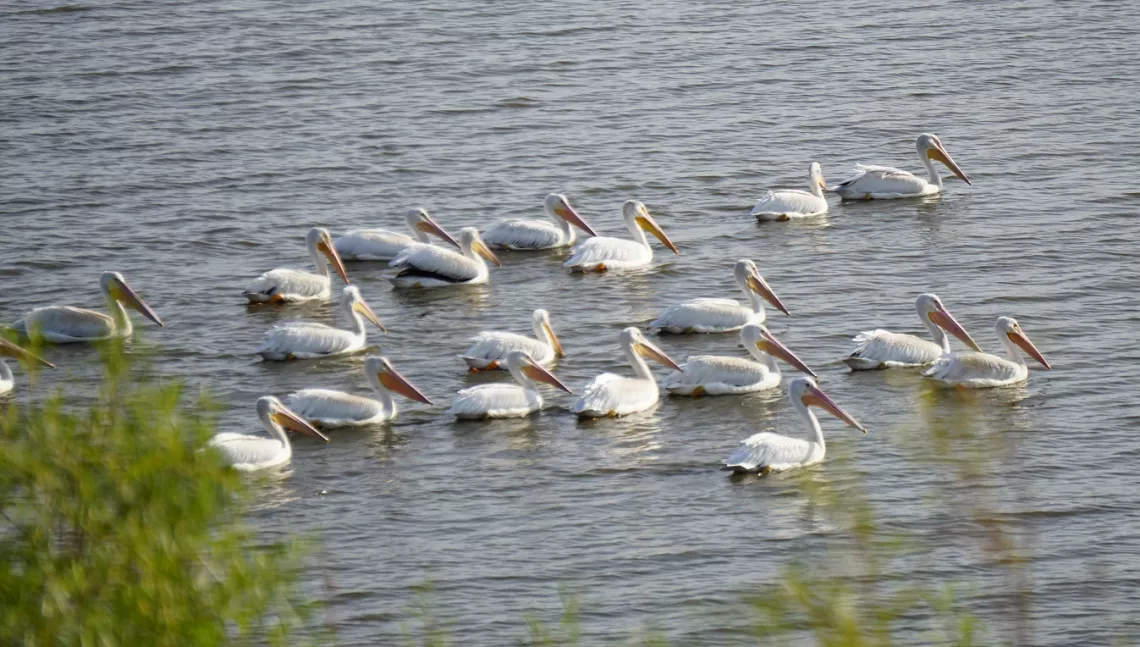"Progress is not made by spectators and cynics, but by activists. And those who say that activism can't produce change should not interrupt those who're doing it."
by Jim Hightower in "Why Air Travel Is So Expensive and Unpleasant", The Progressive Populist, February 1, 2024
Photo above: a great blue heron by Tom Reardon.
What you can do to help the environment
- Ask your state senator to oppose the study of pelican predation, bill SF2326
- Ask your state senator to support the Midwest Interstate Passenger Rail Compact, bill HF591
- Ask your state representative to oppose allowing state agencies to hire CPAs to audit their financial records instead of using the state auditor, bill SF2311
- Continue your advocacy on the carbon dioxide pipeline issues; discuss your concerns about the carbon dioxide pipelines with the Iowa legislators
- Ask your representative to support carbon dioxide pipeline bill HF2522
- Join us on March 6 for a webinar on "Inflation Reduction Act: Opportunities for Iowa". Contact emma.colman@sierraclub.org for more information.
- Reserve the date - March 26 - for a pipeline rally at the Iowa Capitol, 1007 E Grand Ave, Des Moines. More information will be provided in the next newsletter as we get closer to the rally.
- Check out our blog
- Donate to the Iowa Chapter of the Sierra Club so that we can continue our work on protecting Iowa's environment.
In this issue of the Iowa Sierran
Legislative Updates
CO2 Pipeline Update
-
Still waiting on Utilities Board decision on Summit
-
Summit to expand its network of pipelines
-
It’s time for Iowa’s Legislators to pass a bill to stop the carbon pipelines!
-
Save the date for our Carbon Pipeline Opposition Lobby Days at the Iowa Capitol
Protecting the Environment
-
Save the date - May 4, 2024, Outing to Whiterock Conservancy
-
Celebrate the wild! The 60th Anniversary of the Wilderness Act
-
Our Lunch and Learns on environmental topics
-
Plus
-
Contribute to the Iowa Chapter
-
Volunteer for the Iowa Chapter
-
Calendar of events
-
To see the archive of previous Iowa Chapter newsletters
-
To see the White Pine Needle newsletter
Sierra Club opposes study of pelican predation
The Sierra Club opposes bill SF2326, which requires that the Department of Natural Resources (DNR) conduct a study of pelican predation on fish.
The DNR would be required to study pelicans preying on fish and other aquatic life in Iowa’s inland waterways, the Mississippi river, and on private farm ponds. As part of the study, the DNR would consult with US Army Corps of Engineers, the US Fish and Wildlife Service, plus local, state, and federal elected representatives. The legislation requires three members of the public to be assigned to assist and guide the study. The study’s findings and recommendations to be sent to the legislature by December 1, 2025. The estimated cost of the study is $125,000.
Iowa’s Wildlife Action Plan lists the pelican as a species of greatest conservation need in Iowa. That means that the pelican is not endangered or threatened in Iowa, however vigilance is needed to ensure that the pelican is able to remain in Iowa and is able to sustain and grow its population. There is one breeding colony in Iowa, along the Mississippi River in Clinton County.
The legislation makes no mention about other causes of fish loss, such as high nutrient levels in rivers and streams, soil in water which affects water clarity, and fish kills due to manure spills and other pollution.
What you can do:
Ask your Senator to oppose SF2326, a study of pelicans preying on fish.
Midwest Interstate Passenger Rail Compact
On February 19, the Iowa House passed HF591, which allows the state of Iowa to join the Midwest Interstate Passenger Rail Compact. The vote was 85 to 6. The next step is for the Senate to approve the bill.
The compact's purpose is:
-
To promote development and implementation of improvements to intercity passenger rail service in the midwest.
-
To coordinate interaction among midwestern state elected officials and their designees on passenger rail issues.
-
To promote development and implementation of long-range plans for high-speed rail passenger service in the midwest and among other regions of the United States.
-
To work with the public and private sectors at the federal, state, and local levels to ensure coordination among the various entities having an interest in passenger rail service and to promote midwestern interests regarding passenger rail.
-
To support efforts of transportation agencies involved in developing and implementing passenger rail service in the midwest.
Midwest states that can be included in the compact are Illinois, Indiana, Kansas, Michigan, Minnesota, Missouri, North Dakota, Wisconsin, Nebraska, Ohio, and South Dakota, and Iowa. Midwestern states are already planning for more passenger rail. It makes sense for Iowa to have a seat at the table, in planning for future rail. Rail provides a great alternative to cars and planes for travel in the midwest and beyond.
What you can do:
Ask your Senator to support HF591 and SF2315, which authorizes Iowa to join the Midwest Interstate Passenger Rail Compact.
-
Midwestern states are already planning for more passenger rail. It makes sense for Iowa to have a seat at the table with the 8 other states already in the compact.
-
Rail provides a great alternative to cars and planes for travel in the midwest and beyond.
-
Rail provides a form of transportation to those who cannot drive or do not want to drive in large cities - that includes senior citizens, those with low vision, those uncomfortable driving in busier places where they may not know where they are going.
-
Rail can bring tourists into the state and economic development.
-
Rail will reduce the number of cars on our interstates. Adding more driving lanes to our interstates means increased expenses to taxpayers.

Don't hobble the state auditor
A bill - SF2311 - has moved to the Iowa House of Representatives that would allow a state agency or department to select how its finances would be audited - either having the state auditor perform the work or having an outside CPA audit the books. This bill has already passed the Senate.
The Sierra Club opposes SF2311.
Role of the state auditor
Voters elect the state auditor to audit the finances of the state agencies and departments. By auditing the finances of the state, the auditor provides oversight and accountability.
The auditor needs to be able to flag when state agencies and departments are caught mishandling or misappropriating money. Likewise, the auditor needs to be able to flag when individual employees embezzle money and needs to initiate appropriate steps in the legal system. The auditor needs to be tough on corruption. The auditor needs to be able to respond to whistleblowers.
It is up to the auditor to look at the books and ask questions. It is up to the state agency to comply with the requests from the auditor, no matter how embarrassing the questions may be to the heads of state government.
SF2311 has several flaws:
- The state agencies and departments should not be allowed to decide how their books are being audited - that decision should rest with the state auditor.
- If the state auditor needs extra labor to perform audits, it should be a decision made by the state auditor and not by the state agency or department.
- The state auditor should retain supervision over all audits of state agencies and departments.
Ask your state representative to oppose SF2311.
CO2 Pipeline Update
Still waiting on Utilities Board decision on Summit - At this point, the Utilities Board has not issued a decision on the permit application for the Summit carbon dioxide pipeline. The Summit hearing wrapped up in November and the parties have submitted their written briefs and reply briefs.
Summit to expand its network of pipelines - In the meantime, Summit announced that the POET ethanol plants will be connecting to the Summit carbon dioxide pipeline. It is expected that this will significantly expand the pipeline route through Iowa. Summit did not announce their plans for issuing their proposed routes to connect the additional ethanol plants to the pipeline, holding public meetings about the route, and submitting their application.
Can counties have ordinances about the siting of carbon dioxide pipelines? A number of counties have been passing ordinances that affect the siting of carbon dioxide pipelines. Summit sued those counties in federal court and claimed that they did not have jurisdiction for siting and that the responsibility and oversight for siting issues lies with the federal Pipeline and Hazardous Materials Safety Administration (PHMSA). PHMSA issued a letter saying it did not have jurisdiction over siting of pipelines. In spite of that, a federal district court judge ruled that the counties could not pass their own ordinances. Some of the counties have appealed that decision to the Eighth Circuit Court of Appeals. Initial briefs on that appeal are due March 8.
It’s time for Iowa’s Legislators to pass a bill to stop the carbon pipelines! Sierra Club members, landowners and everyday Iowans have been going up to the capitol for two legislative sessions and we’ve grown our power along the way. This is our third legislative session and we want our legislators to pass a bill now! We are asking the members of the House of Representatives to pass bill HF2522 which allows a landowner to ask a court to issue a declaratory order about the legality of the use of eminent domain, without going through the full Iowa Utilities Board hearing. Ask your representative to support HF2522.
Save the date for our Carbon Pipeline Opposition Lobby Days at the Iowa Capitol
Pipeline Opposition Rally & Lobby Day, Tuesday, March 26, 2024, at the Iowa Capitol, 1007 E Grand Ave, Des Moines. Wear Red! We will announce the details in our March newsletter.

Dead Gray Wolf Found in Davenport
On February 19, 2024, a deceased gray wolf was found in the median of I-80 on the northwest edge of Davenport, near the intersection of I-280. The male wolf was estimated to be around two years old. It weighed 77.5 pounds, and measured 62 inches long from nose to tip of the tail. The Department of Natural Resources collected DNA from the wolf and investigating its population of origin. Vince Evelsizer, state furbearer biologist, indicated "this wolf likely originated from the Great Lakes population in Wisconsin and Minnesota".
Wolves are protected from hunting in Iowa. There is no breeding population of wolves in Iowa. Periodically wolves are spotted in the state.
Health Risk from Coal Plant PM2.5
Burning coal is a climate change issue and also a public health issue.
Recent research shows that the public health harm from the particulate matter created by coal plants (PM2.5) is more damaging than the particulate matter created by other sources.
PM2.5 is also known as fine particulate matter. It can be drawn deep into the lungs.
The study showed that "exposure to coal plant PM2.5 was associated with 2.1 times greater mortality risk than exposure to PM2.5 from all sources. A total of 460,000 deaths were attributable to coal PM2.5, representing 24% of all PM2.5 -related Medicare deaths before 2009 and 7% after 2012."
The Sierra Club is continuing its work in Iowa on shuttering the remaining coal plants in Iowa.
See "Mortality risk from United States coal electricity generation" by Lucas Henneman, Christine Choirat, Irene Dedoussi, Francesca Dominici, Jessica Roberts, Corwin Zigler, Science, November 24, 2023
Photo below is of the George Neal North Coal Plant, by Emma Colman.

Proposed Animal Confinement Rules
The Department of Natural Resources is in the process of revising its rules on confinements, called Chapter 65 rules. This resulted from an executive order by the Governor requiring all rules be repealed, evaluated to be less restrictive to business interests, and rewritten and resubmitted.
The Sierra Club has been following the DNR's reworking of these rules and submitted comments about the latest proposed changes. To read our comments.

Save the date - May 4, 2024, Outing to Whiterock Conservancy
The Chapter will be having an outing to Whiterock Conservancy in Guthrie County, outside of Coon Rapids, Iowa, on May 4, 2024. We are planning three hikes. One hike will be a shorter, easier hike along the Raccoon River. A second hike will last a couple of hours and will be a little more strenuous, starting along the Raccoon River. A third shorter hike will be on the trail that leads from the Visitor Center to the Garst homestead. We will have hike leaders who can point out flowers and birds. This will be in the prime of the song bird migration and the blooming wildflowers.
See a Map of Whiterock Conservancy
Whiterock Conservancy, is a gift of nature to Iowa and its citizens from the Garst family. The 5,500-acre non-profit land trust sits in and along the valley of the Middle Raccoon River in a rugged and ecologically diverse landscape. Whiterock Conservancy is a great example of a “working landscape.” A working landscape is an approach to managing land and natural environments that balances social, economic and ecological needs. Business and social activities are done in a way that minimizes the disturbance of native plants and animals. A working landscape is an area where humans work as responsible members of a natural ecosystem. The outcome is mutual sustainability for people and for nature.
The mission of Whiterock Conservancy is threefold. It integrates 1) ecological restoration and conservation of biodiversity, 2) regenerative agriculture with sustainable farming practices, and 3) recreation and education featuring 40 miles of trails and 8 miles of river.
Field trip participants will learn more about what Whiterock does to achieve this mission and see first-hand the results of Whiterock’s first 20 years of land stewardship.
Schedule:
12:30 – Meet at the River Campground for outdoor program.
12:30 to 12:45 – Introduction to Whiterock Conservancy, Kate Zimmerman, Director of Whiterock Conservancy.
12:45 to 3:00 – Option of two short hikes - Hike #1 or Hike #2 - to see Whiterock Conservancy.
3:00 to 3:30 – Break. Meet at the visitor center to use the restrooms, fill water bottles, and pick up information about Whiterock Conservancy and the Sierra Club.
3:30 to 5:00 – Hike #3 Low Difficulty hike to the Historic Garst Farmhouse. Meet at the Visitor Center and hike to the Farmhouse or drive to the Farmhouse and meet those who are hiking.
Description of hikes:
Hike #1 - Low Difficulty – Kate Zimmerman will lead a group downriver from the campground. Forest, grassland, wetland and stream habitats will be observed. Participants will hike about 0.5 miles on a riverside trail to a turn around point. On the way back there will be two options.
Option A – Continue back to the river campground on your own. This option has a total distance of 1.0 mile and no elevation gain.
Option B – Kate will lead participants on a side loop trail back to the campground that will take you out of the floodplain and on to the adjacent upland where you should see a greater variety of flora and fauna. This option has a total distance of 1.25 miles and 60 feet of elevation gain.
Hike #2 - Medium Difficulty – Tom Rosburg, Professor of Biology at Drake University and consulting research ecologist at Whiterock Conservancy, will lead a group upriver from the campground. Habitats observed will include a large wet seep (a special type of wetland), riparian, upland forest and reconstructed prairie. The total distance is about 1.5 miles with 170 feet of elevation gain. There will also be a short distance of off-trail hiking.
Hike #3 Low Difficulty. Kate and Tom will lead a group to the Historic Garst Farmhouse, where participants will learn about its important history as the home of Roswell and Elizabeth Garst, the site of the 1959 visit by Soviet Premiere Nikita Khrushchev, and the cradle of hybrid seed corn. Total distance for the hike is 1.5 miles and there is no significant elevation gain.
On your own
For those who want to spend more time at Whiterock, there are many activities you can do on your own - biking, hiking, camping, staying in one of the farm houses on the property, exploring the history of the Garst family, and more.
Save the date - May 4, 2024 - and plan to join us on one of the hikes. We will have more details in future newsletters.
Celebrate the wild! The 60th Anniversary of the Wilderness Act
2024 has arrived and with it the sixtieth anniversary of the Wilderness Act that established America’s National Wilderness Preservation System.
Wild nature and wilderness is needed today, more than ever as good habitat to preserve wildlife in a crisis era of species extinction. Six states, including Iowa, have no federal wilderness areas.
On September 3, 1964 , when President Lyndon Johnson signed the Wilderness Act, he brought into being a brand new national wilderness system protecting 54 areas in 13 states—places that had already been administratively protected by the Forest Service. But because such administrative protection was temporary and haphazard, wildlands advocates saw that a national law was needed for enduring protection of wild, natural land from development.
Today, that wilderness system has grown to 806 areas in 44 states plus Puerto Rico—with stewardship by all four federal land agencies. That's plenty of reason to celebrate—and to work for even more.
Senator Clinton Anderson of New Mexico (the state where the Forest Service designated its first administrative wilderness – the Gila) wrote: “wilderness is an anchor to windward. Knowing it is there, we can also know that we are still a rich nation, tending our resources as we should, not a people in despair searching every last nook and cranny of our land for a board of lumber, a barrel of oil, a blade of grass, or a tank of water.”
Join us for interesting and informative webinars
Lunch and Learns
Every Friday at noon, we do a Lunch and Learn livestream. See us on Facebook at "Sierra Club Iowa Chapter". These will be recorded so you can watch them anytime. Topics will be selected based on what is happening during the week and will be announced the day before the livestream. During the legislative session, we cover issues coming before the Iowa legislature.
In case you missed our past webinars and lunch and learn sessions, you can still see them.
- Watch "Bill Update!", February 23, 2024
- See "Strengthen and Pass HF2522", February 16, 2024
Volunteer for the Iowa Chapter
Almost everything we do is done by volunteers like you. If you would like to volunteer for the Iowa Chapter, please let us know by sending an E-mail to Iowa.chapter@sierraclub.org. Or sign up by using the online form. There are many opportunities for you to make a difference:
-
making phone calls
-
developing graphics for banners and flyers
-
working on legislative issues
-
working on elections
-
fundraising
-
organizing events
-
joining an issue committee
If you would like to join our legislative action team, sign up here. Keep on top of what is happening at the Iowa legislature. Be alerted when you should contact your legislators about pending legislation.
Contribute to the Iowa Chapter
Sierra Club - working every day on Iowa’s environmental problems
Sierra Club is Iowa’s oldest and largest grassroots environmental organization. Not only that, we are the best bet in the state for achieving bold solutions to Iowa’s environmental problems.
We work in the courts, before Iowa’s public agencies, and in the halls of the legislature. The Iowa Chapter's effort to protect the environment takes financial support. The Chapter receives very little financial support from the national Sierra Club. Can we count on you for a donation to ensure even more victories? Your contribution will be put to work here in Iowa on issues that affect every day Iowans – water quality, clean air, protection of Iowa's soil, parks and natural areas, and a strong democracy. The Iowa Chapter is relentless in fighting back bad legislation that affects every one of us.
Your non-deductible contributions make it possible for us to fight bad legislation and to promote good legislation. We appreciate your past and on-going support of these efforts. You can make a non-deductible donation with a credit card. A non-deductible donation supports the Chapter's effective, citizen-based advocacy and lobbying programs. If you prefer, a non-deductible check can be written to the Sierra Club Iowa Chapter and mailed to:
Treasurer
Sierra Club, Iowa Chapter
PO Box 1058
Marion, IA 52302
You can also make a tax-deductible donation with a credit card. Tax-deductible activities are limited to public interest education, research and legal actions. A deductible check can be written to the Sierra Club Foundation with “Iowa Chapter” written in the memo line.
Thank you for your support.
Donate your used vehicle
As the Sierra Club Foundation's Iowa Chapter continues to raise charitable funds to support its work in Iowa, won’t you consider participating in our vehicle donation program? Our partners over at CARS have made the process of donating your unused or unneeded car, truck, motorcycle, boat or RV easy, efficient and secure. They’ll take care of everything from picking up your vehicle to sending you a tax receipt for your generous gift. To learn more about The Sierra Club Foundation's Iowa Chapter vehicle donation program, please call 844-674-3772. Or visit our webpage to get started today!
Sierra Club Foundation promotes climate solutions, conservation, and movement building through a powerful combination of strategic philanthropy and grassroots advocacy. The Foundation is the fiscal sponsor of Sierra Club’s charitable environmental programs.
For more information
Planned giving . . . naming the Sierra Club Iowa Chapter in your will
Ensure your environmental legacy by naming the Iowa Chapter in your will or trust. These gifts cost you nothing now. You can hold onto your assets for as long as you need them.

Thank you for supporting our work!
| When | Earliest: Latest: |
| What |
|
| Word or Phrase | Word or phrase to search for: |
| Leader | All or part of leader name to search for: |
No Matching Activities Found
Loading
| Date | Activity (click title for full description) | Sponsor | Category | Type | Difficulty | Links |
|---|
Loading ...
 Outing
Outing Club support event
Club support event  Social event
Social event  Activist event
Activist event  Multiple events (map only)
Multiple events (map only)